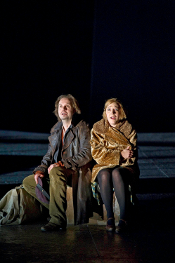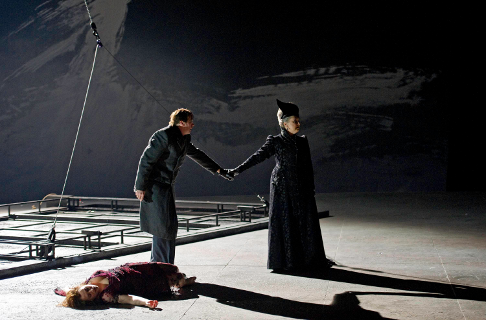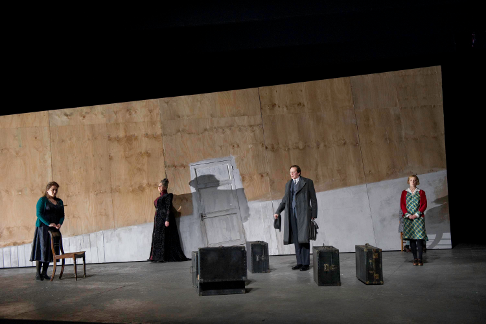17 Mar 2010
Katya Kabanova, London
Anguished, lacerating, irredeemably tragic, David Alden’s new production of Katya Kabanova presents a drama of unalleviated suffering and unremitting bleakness.

Anguished, lacerating, irredeemably tragic, David Alden’s new production of Katya Kabanova presents a drama of unalleviated suffering and unremitting bleakness.
Therein, perhaps, lies the one weakness in this powerful and impressive staging. For Janačék’s opera, while admittedly melancholic and menacing, contains contrasting moments of ecstatic joy, matched by melting sonic radiance — moments which resonate with gleams of light and colour, but which were almost wholly subdued by the sinister grey tones of Alden’s vision.
Alden knows this territory well, as his 2006 Jenůfa and more
recent Peter Grimes testify. The slanted perspective of the steeply
raked set, lend an air of edginess. Sudden and extreme changes of lighting
(designed by Adam Silverman) cast monstrous shadows across the immense expanses
of the bare, decrepit stage, its distressed emptiness broken only by a lone
chair, a single lamp-post. All seems somewhat familiar … And indeed, as
an abstract portrait of torment and pain, it serves its purpose well. Yet, the
very vastness of this landscape makes it difficult to convey the claustrophobic
tension which suffocates the eponymous protagonist. Set in a stifling,
provincial community, Katya Kabanova relates the persecution and
destruction of a pure heart; Katya battles with her inner demons and struggles
against the mean-spirited hypocrisy of the mercantile Russian villagers who
judge her. It is the explosive shattering of the chains that bind her soul and
body that destroys the village’s self-righteous complacency, and propels
Katya to tragedy — Ostrovsky’s play, on which the opera is based,
is aptly called ‘The Storm’. But Charles Edward’s design,
which suggests the infinite vistas of the Siberian steppes, does not capture
the constriction and restriction which is both within and without the tragic
heroine. Alfie Boe as Vanya Kudrjas and Anna Grevelius as Varvara
Alfie Boe as Vanya Kudrjas and Anna Grevelius as Varvara
The characterisation of Katya by American soprano, Patricia Racette, making her debut at ENO, was in accord with Alden’s expressionistic conception. Her total isolation was sustained throughout, her psychological and spiritual distance from the other characters and her yearning for escape suggested by her frequent positioning at the furthest edges of the stage. Isolation increasingly became self-absorption; separated by the entire width of the stage, Katya and her lover, Boris (Stuart Skelton), seemed emotionally disconnected — Racette’s Katya is more in love with love than with this weak, pitiful merchant. Confident and sure throughout, Racette was certainly technically in command of the role. Yet, when Katya sings to Varvara in Act 1 of her youthful dreams, her melody should float and soar as easily and freely as the birds she has longed to emulate. Racette’s strong tone, together with a tense, close vibrato, seemed too mature, and lacked the sweetness and air of fragility which might express her essential innocence.
Janačék’s compression of Ostrovsky’s drama does to some extent render the characters one-dimensional. But Alden, and his costume designer, Jon Morrell, take this one step further, and reduce nearly all the other roles to caricatures. A floor-length black cloak hiding a glittering red gown, topped with a threatening, pointed headpiece, Susan Bickley’s Kabanicha is a terrifying figure of authority and intimidate — the stereotypical butt of all mother-in-law jokes, she resembles a vicious Lady Macbeth, dominating and demeaning all. Bickley’s full, true tone fortunately prevented this harridan from sounding as well as looking shrew-like; but, should she really so openly acknowledge her own hypocrisy and sexual avarice, brazenly turning the disapproving gaze of a religious icon to the wall before subjecting the willing Dikoy (Clive Bayley) to some degrading sexual bullying?
 Susan Bickley as Marfa Kabanicha and John Graham-Hall as Tikhon Ivanich Kabanov
Susan Bickley as Marfa Kabanicha and John Graham-Hall as Tikhon Ivanich Kabanov
The men, on the whole, were a pitiful and contemptible bunch. Both Boris and Tikhon are weak-willed, self-preserving specimens. Skelton sang lyrically, but his tone was rather lifeless — there was little to suggest that he could inspire Katya to such heights of passion. John Grahan Hall’s Tikhon was a wretched victim of his mother’s oppression, and at times he communicated the pathos of his situation, although like Bayley’s Dikoy, his mannerisms were frequently too exaggerated and over-blown. It was left to Anna Grevelius as Varvara and Alfie Boe as Kudrjas to introduce some convincing humanity into this community of grotesques. The brightness and energy of their singing injected a convincing sense of fun and spirit, Boe’s warm tone in particular conveying the optimism of youth. The healthy, down-to-earth practicality of this pair of lovers presented a stark contrast to the self-destructive, dreamy solipsism of Katya and the directionless ineptitude of Boris.
From the opening bars, where muted lower strings tenderly evoke Katya’s purity of spirit and the frailty of her hopes, as well as the dark depth of the river which will claim both, Mark Wigglesworth draw from his orchestra playing of exceptional clarity and rhythmic vitality. The layered textures of Janačék’s driving motifs were expertly constructed, each melodic pattern contributing to the meaning of the whole. Wigglesworth effectively built up the tension in Act 3, confidently controlling both the rhythmic onslaught and the silences, as the drama lurched to its bitter conclusion.
 Patricia Racette as Katerina Kabanova, Susan Bickley as Marfa Kabanicha, John Graham-Hall as Tikhon Ivanich Kabanov and Anna Grevelius as Varvara
Patricia Racette as Katerina Kabanova, Susan Bickley as Marfa Kabanicha, John Graham-Hall as Tikhon Ivanich Kabanov and Anna Grevelius as Varvara
On stage, in contrast to this detailed musical drama, the semiotics were unashamedly blatant. A vast propaganda poster depicting a Munch-like impression of hell prophesised damnation, its fall to the ground foreshadowing Katya’s own suicidal descent into the waters of the Volga. Why does she confess and leap into the treacherous waters? Katya is a victim not just of her own conscience. In such a soul-destroying, emotionally-deadened world, her innate life-spirit and passion can only find an outlet in religious devotion. And, she is watched and judged not just by God but by the Kabanicha and the village she represents. Thus, Katya is sacrificed to preserve a self-satisfied and repressive regime. However, in Alden’s view, Katya is as alone in death as she has been in life. Having reduced the repressive village to a few grotesque eccentrics, even the latter are distanced at the close, emotionally removed from the human loss which is so profoundly and poignantly conveyed in the music.
Claire Seymour